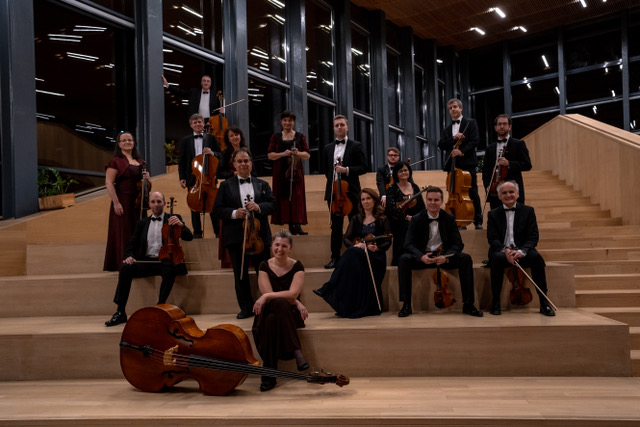Mörk: Hungarian Psychedelic Soul Finds International Audience
_SMALL.jpg)
From left, Damján Ocsovay, Márk Zentai, Dániel Szabó, and Bálint Szeifert.
Photo by Karmatik Photoraphy.
Don’t quote me on this, but Mörk might be the first ever Hungarian band to be mentioned on the U.K. music website NME.
In a review of this year’s Sziget highlights, NME’s Mark Beaumont described the band as “soul futurists [.…] masters of cosmic jazz pop, part Khruangbin, part ‘80s R&B, entirely engrossing.”
That’s high praise indeed, especially as foreign reviewers tend to ignore the Hungarian acts that pack the smaller tents at Sziget.
For those of you who don’t know Khruangbin, they’re an American band that blends soul, rock, dub reggae and psychedelia.
Mörk is Dániel Ferenc Szabó (drums), Damján Ocsovay (keyboard and vocals), Bálint “Jason” Szeifert (bass, guitar), and Márk Zentai (lead singer and guitar), and formed in 2014.
“Me, Dániel, and our former keyboardist Gábor Novai Jr. were studying at the jazz faculty of Kodolányi János University in Székesfehérvár,” Zentai tells me. “As part of my course, I had the opportunity to make a record, so I asked the others to join me.”
That record led to a debut album, “You Are Free to Choose,” released in 2016. “We enjoyed it so much that we kept going. We met, jammed together, and had a lot of fun,” Zentai recalls.
Building Buzz
Now, Mörk is building quite the buzz outside Hungary. This year, they were part of The Great Escape Festival in the United Kingdom’s ultrahip seaside town of Brighton. They’ll be playing the festival again in 2023.
In August, Mörk was featured on the Brownswood Basement show hosted by broadcaster, DJ, and record label-owner Gilles Peterson on internet radio service Worldwide FM. This is where I heard them first. I only knew they were Hungarian because I’d seen their name on the list of upcoming bands for the Budapest music boat venue A38.
It’s fair to say that Hungarian soul is not exactly a rich, deep genre. Go into a Hungarian second-hand record shop, and the Hungarian funk/soul/disco section is always the thinnest. Invariably, the Hungarian take on Eurodisco, an acquired taste, dominates.
That’s not to say Hungarian musicians couldn’t play funk and soul. The great Sarolta Zalatnay’s 1973 album “Hadd Mondjam El” (“Let me Tell You”) on Hungarian state label Pepita proves they could. Although I can’t understand a word she’s saying, Zalatnay’s voice is as raw and soulful as anything I’ve heard. But she didn’t sing in English, which meant that, at the time, “Hadd Mondjam El” was a nonstarter outside Hungary.
I say at the time because, thanks to some American hip-hop dudes sampling the title track and it being released on boutique label Finders Keepers’ hilariously titled “Well-Hung” compilation, “Hadd Mondjam El” is now a collectors’ item. My copy cost me around EUR 50.
(Incidentally, if you want a taste of pure Hungarian soul, type in “Zalatnay Sarolta - Omega - Nem várok holnapig – 1967” on YouTube and be prepared to grin from ear to ear.)
While Zentai agrees with me that 1960s and ‘70s Hungarian music is well worth exploring, he’s proud when foreign listeners say the band doesn’t sound Hungarian at all.
“Our last record, ‘In the Golden Hour,’ is produced to a standard that’s quite rare in Hungary and we recorded it in our rehearsal room. The concept and execution, the whole aesthetic, were right.”
Pure Voice
I agree with Zentai. “In the Golden Hour” is an excellent album, and I urge you to check it out. But, for me, one of the reasons Mörk is finding listeners overseas is that Zentai, who has a lovely pure voice that verges on soul falsetto, sings in English. Even if, given the band’s psychedelic flavor, I’m not quite sure what he’s singing about, I’m at home with the sound.
Leaving aside considerations of comprehensibility, I don’t think Mörk’s songs would work anywhere near as well if they were sung in Hungarian. To my ear, it’s a language that has a certain stridency that, in pop at least, works best with faster, busier rhythms. Mörk’s stuff is languid, laidback, and drifting, and Zentai’s voice is perfect for it.
But, apart from making music that fits perfectly into the neo-soul/funk and jazz niche, Mörk also has a game plan. Speaking to Zentai, it’s clear that he and the band are determined that Mörk is heard as widely as possible beyond Hungary’s borders.
Getting their music heard by tastemaker and shaper Gilles Peterson was top of the band’s wish list for years. But, as Zentai says, “although the internet is great for finding out how to contact the right people, reaching them and their audience is still very, very hard.”
Fortunately for Mörk, their manager had a contact working with Peterson and managed to persuade him to listen to “Baby,” a single off “In the Golden Hour” featuring renowned Japanese jazz/neo-soul trumpeter Takuya Kuroda. Peterson loved the single and played it on his influential BBC Radio 6 show, listened to all over the world.
Exposure such as this, and playing live, connects Mörk to audiences in the parts of Europe and beyond that produce great artists making the soulful music the band worships.
“For us, soulfulness is very important, and it’s not very prevalent here. It’s kind of missing from the tastes of listeners and creators,” Zentai says. “We want to be part of an international soul and funk scene, not necessarily physically, although it would be nice to play more in places like the U.K., France and the Netherlands.”
The band is also driven. “We’d love to get a good label partner or some kind of label services, someone who could help us reach a wider audience,” Zentai says. “We’re recording demos right now and will be sending them to labels we like. We’ll also try to collaborate with people we admire, such as Takuya Karoda and U.K. poet and MC Brother Portrait, who’s amazing.”
Mörk plays at a special show at the Synagogue in Rumbach Sebestyén utca as part of Budapest Showcase Hub on October 20. As the NME says, the band is excellent live.
This article was first published in the Budapest Business Journal print issue of September 9, 2022.
SUPPORT THE BUDAPEST BUSINESS JOURNAL
Producing journalism that is worthy of the name is a costly business. For 27 years, the publishers, editors and reporters of the Budapest Business Journal have striven to bring you business news that works, information that you can trust, that is factual, accurate and presented without fear or favor.
Newspaper organizations across the globe have struggled to find a business model that allows them to continue to excel, without compromising their ability to perform. Most recently, some have experimented with the idea of involving their most important stakeholders, their readers.
We would like to offer that same opportunity to our readers. We would like to invite you to help us deliver the quality business journalism you require. Hit our Support the BBJ button and you can choose the how much and how often you send us your contributions.








